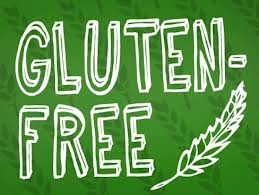What does a gluten-free diet mean?
In recent years, more and more gluten-free choices are in grocery stores, farmer markets, and restaurants. Gluten-free products are marketed to people who wish to exclude the protein gluten from their diet, which is found in many grains.
Examples of grains that include gluten are:
Wheat
Barley
Rye
Triticale
This gluten-free diet is essential for a person with celiac disease. Celiac disease is a condition when the small intestine is inflamed due to the consumption of gluten. Removing gluten from their diet helps to reduce their signs and symptoms of the disease. Only about 1% of Americans have this disease; and yet the market for gluten-free products is rapidly increasing. Many experts believe that people perceive this gluten-free diet healthier compared to a diet including gluten. Others believe that people are self-diagnosing celiac disease. The only way to know if you have celiac disease is to contact your doctor and get tested.
What is the risk of a gluten-free diet?
According to WebMD, if people are not careful consuming a gluten-free diet can lack vitamins, minerals, and fiber. Whole grain foods in well-balanced diet may lower the risk of heart disease, type-2 diabetes, and some cancers. Therefore unless diagnosed with celiac disease or gluten sensitivity, there is no reason to remove gluten from your diet.
Again, if you believe you may have celiac disease or gluten sensitivity, contact your doctor.
If you are following the gluten-free diet, it’s a good idea to consult with a registered dietitian.
References
Celiac Disease Foundation. (2013). Gluten-Free Diet. Retrieved from http://www.celiac.org/index.php?option=com_content&id=138&Itemid=239
Mayo Clinic. (2011, December 20). Gluten-free Diet: What’s allowed, what’s not. Retrieved from http://www.mayoclinic.com/health/gluten-free-diet/my01140
WebMD. (2011, March 2). The Truth About Gluten. Retrieved from http://www.webmd.com/diet/healthy-kitchen-11/truth-about-gluten?page=1


You bring up a good point about the actual reason for gluten-free foods–celiac disease. Although only such a minute percent of the U.S. population has the disease, it is apparent that gluten-free foods has grown into such a huge diet trend. I found an article that numerous food companies are rushing to have their products become certified “gluten-free” with the intent more on the diet trend rather than for those with celiac disease. The Gluten Intolerance Group grants these certifications, and informs these companies that it is not necessary for all food products, but some companies insist on the certification anyway for marketing purposes. Even some branches of Dunkin Donuts are offering gluten-free doughnuts!
So I think it would be great if more people were made aware that gluten-free foods are aimed primarily for those with celiac disease and there may be risks in excluding it from their diet.
Pingback: Is Gluten Intolerance the same as Celiac Disease? | Healthy Concepts with a Nutrition Bias
I have also heard that vary few people actually need to be on a gluten free diet. I never knew that celiac disease was the reason that people followed a gluten free diet. I just thought it was some type of ‘fad.’ I do know that gluten is found in other foods in addition to just grains. I thought this website was very throughout with the list of foods someone on a gluten free diet should avoid: http://www.massgeneral.org/digestive/assets/pdf/gluten_free_diet.pdf I would have never expected mac & cheese, beer, Chinese food, hot dogs, and gum would contain gluten!!
Gluten Free foods have become a big craze recently. I never understood why is was suddenly so popular. Many people want to go Gluten-free and I am glad that you distinguished why people would have to follow a gluten-free diet because many people do it because they believe it healthier. It surprising how quickly something can become so popular if it is rumored to be healthy for you without actual data backing it up.
I followed a gluten-free diet for a while to test if the issue I was having was caused by a gluten sensitivity. It was expensive and did not taste very good! It really surprises me when people follow the gluten-free diet because they think it is healthier. This diet tends to really limit your choices, even with all the health food stores popping up. I remember that they used this diet as a fad diet in Hollywood a couple of year ago. It is good for weight loss because there is a very low number of carbs available in the diet. The whole idea of people following this diet that do not have to be is a little absurd to me!
This diet is sometimes suggested to children that are on the Autism spectrum as an alternative treatment plan. http://www.webmd.com/brain/autism/gluten-free-casein-free-diets-for-autism. It has not been proven one way or another, but is often used in addition to other treatments and therapies.
Gluten-free trend really does need to end. I’m glad you pointed out the real reason for not eating gluten, which is Celiac-disease. Also asjanessmallwood86 says its an expensive diet, which the majority of the people who follow it do not need it. I knew someone who had to follow a Gluten free diet, near the end of my college undergraduate career. He was pretty happy that the gluten-free trend was catching on , because it made it easier for him to go out to dinner with his girlfriend to places she enjoyed. He did not understand why anybody would be gluten-free though. He would always tell me how much it sucks , and all the things he used to miss out on.